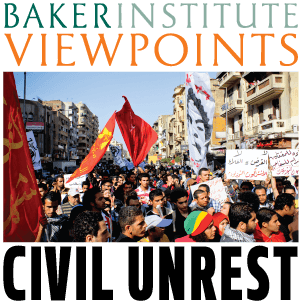In light of the radical changes in the Middle East and North Africa following the Arab Spring, civil unrest has become an issue of utmost concern for policymakers, analysts and academics. Nowhere can the implications of ignored or improperly addressed public discontent be seen more clearly than in Syria’s brutal and potentially regionally destabilizing civil war. Widespread protests are also disrupting — and even overturning — the status quo in Brazil, Turkey and Egypt. In the fifth of a seven-part Baker Institute Viewpoints series, we evaluate the impact that this new wave of civil unrest will have on international politics. In the coming days, institute experts will address the effects on U.S. foreign policy, unexpectedly stable regimes, analytical tools for understanding civil unrest and political philosophical conceptions of “just” societies.
Read other posts in this series:
- Turkey, Brazil and Egypt: The stakes for the United States by Joe Barnes, Bonner Means Baker Fellow
- Egypt and the Gulf: The illusion of stability? by Kristian Coates Ulrichsen, fellow for Kuwait
- Chaos in the streets? Blame cyberspace! by Chris Bronk, fellow in information technology policy
- What civil unrest in Brazil portends for the international system by Nathan Jones, postdoctoral fellow in drug policy
- A new wave of democracy in Turkey by Dina Shahrokhi, research associate for the Middle East
- Egypt after the coup: Only the beginning of the beginning by Albert B. Wolf, doctoral candidate at the University of California, Irvine
It is hard to tell whether the Arab Spring is contagious or not. The problems of the Arab world run deep and might be influenced by an underlying religious and cultural component not found in other parts of the globe. What is certain, however, is that popular discontent has now reached well beyond the borders of the Arab world. First, it was Turkey that displayed signs of political restlessness; now, Brazil is wracked by demonstrations stemming from economic dissatisfaction. Keen observers of the Mexican political and economic landscape are now asking: Is Mexico next?
Although nothing is predetermined, there are signs that Mexico may become the next domino in this chain of popular frustration. Mexico, like Turkey and Brazil, is an emerging market democracy. Moreover, the up-to-now silent displeasure in Mexico is both political (as it was in Turkey) and economic (as it was in Brazil). There is currently a deep dissatisfaction with the results of democracy, and many Mexicans are disillusioned with the inability of the existing political parties to deliver.
There is also an emerging sense that corruption has touched nearly every single member of Mexico’s political body, many who lately have been found to be pillaging the public coffers. There is also much anger toward deepening inequality, which social aid programs do not seem to adequately address. Mexicans are also experiencing a generalized feeling of injustice layered over a deep public-safety crisis that the Peña administration seems bent on ignoring. New numbers also show that Mexican youth face a profound lack of opportunities. And lately, the economy is showing signs of weakness, with stubborn under- and unemployment, rising inflation, low salaries and now a weakening peso. In the last quarter, the economy grew at a meager 0.8 percent. Mexicans are also becoming increasingly disaffected with their local and state governments, which they see not only as corrupt but also as increasingly unable to provide basic public services, despite the fact that the middle class is overburdened with taxes. In addition, Mexicans pay American prices for many goods and services, while their salaries are only a fraction of those in the United States. On top of it all, there is a dearth of channels through which citizens can participate in public decision-making or express their frustrations.
This combination of elements makes for a volatile environment and, while we cannot underestimate the ability of the Mexican people to withstand severe political and economic crises with the patience and devotion of a medieval saint, the level of frustration is rising. Any event could trigger impassioned public demonstrations: the federal government’s suggestion that it will open national oil company PEMEX up to private investment; the unwillingness of judicial institutions to hold accountable a deeply corrupt set of governors and mayors; the inability of the major public universities to absorb the country’s high school graduates, who are turned away by the hundreds of thousands every year; or even something as mundane as a hike in transportation prices, as happened in Brazil.
What has so far kept Mexico together is a pact between the three major political parties: the Institutional Revolutionary Party (PRI), the National Action Party and the Democratic Revolution Party. This congressional coalition has been able to pass through important reforms, including in labor, education and telecommunications. This has enabled the Mexican economy to roll with the punches. But Mexicans are politically and economically savvy and understand that politicians are in it for themselves, and that big business has essentially held the economy hostage to its massive monopolies that extract resources from every Mexican, every day, with every transaction.
For a while, the middle class thought that voting for another party would solve Mexico’s problems. Then, they thought that bringing the PRI back would do it. Now they are outright disaffected. If the government does not act quickly to assuage its citizens’ concerns and allow a greater number of outlets for their anger, this could give the middle class the perception that they have no options but to take to the streets.
Tony Payan is the Baker Institute’s fellow in Mexico studies and director of the Mexico Center.

